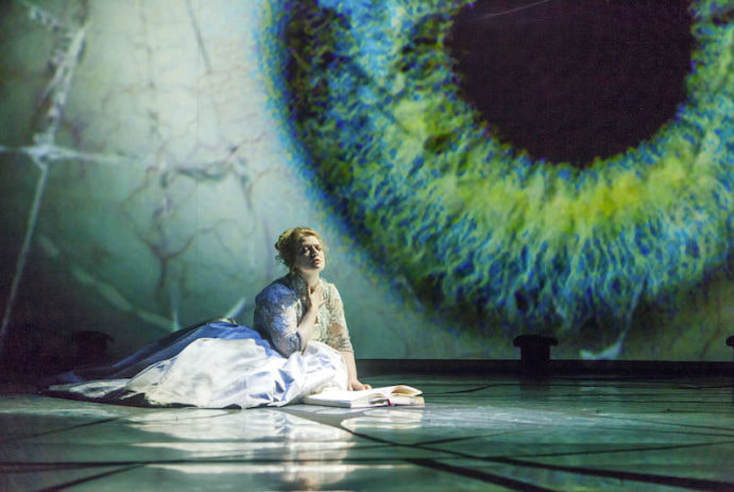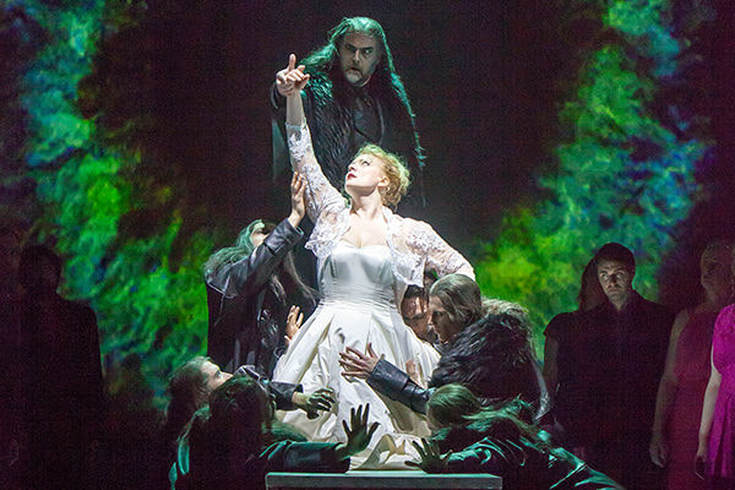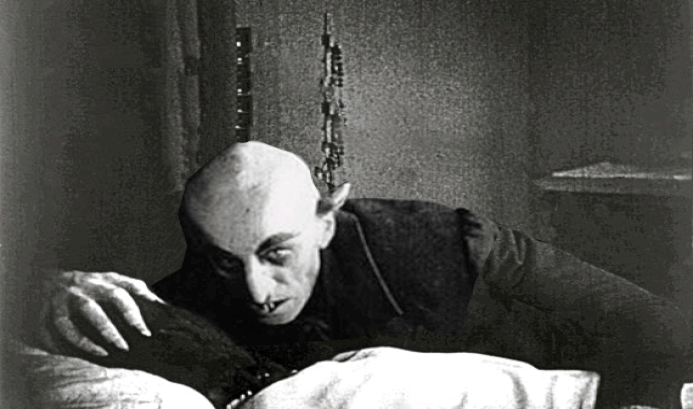After productions of Der Ring des Nibelungen and Tristan und Isolde, De Nederlandse Reisopera once again sails the stormy waters of the Wagner drama with Der Fliegende Holländer He would rather die ten times than sail the seas for one more day, but the curse that has struck him has condemned him to roam the earth forever. He has become discouraged, only the possible perishing of the world seems to offer him a solution. Every seven years he is allowed ashore to find a woman who can rid him of his curse. To find a woman who - by a vow of eternal fidelity - can give him the peace he so desperately seeks. In Amsterdam we didn't have to wait seven years for Der Fliegende Holländer to dock again. Last weekend it was exactly five years ago that the captain of the ghost ship gave its semi-concertante acte the presence in the Concertgebouw. Where the Royal Concertgebouw Orchestra, conducted by a conductor of Bayreuth-fame, Andris Nelsons, gave a rather cumbersome reading of Der Fliegende Holländer on that occassion, Benjamin Levy, in a production for De Nederlandse Reisopera, led the Noord Nederlands Orkest with relatively swift tempi and a swinging impetus through the turbulent waves of the opera that can be considered as the beginning of Wagner's mature oeuvre. Director Paul Carr uses the overture to introduce the audience to Senta's obsession before the libretto does. We see a woman in a wedding dress, her arms clinging to a book, in a certain state of frenzy. Longing for a man who is out of reach: like a teenage girl who dwells at the poster of a pop idol. Almost religiously inspired, Senta claims a leading role in the story that follows. In search of fulfilment, she will sacrifice her life so that the Dutchman can be freed from his curse. She will find her reward in a life after death with Der Holländer (a transfiguration in love ). We look at a projection of a big eye, as if Senta is taking us along in the story that unfolds, looking at it through her eyes. This production of Der Fliegende Holländer is, following their excellent Ring des Nibelungen and the mother of all Erlösungsbedurftige operas, Tristan und Isolde, the next triumph in the field of Wagner from De Nederlandse Reisopera. From the overture on (was a stormy sea ever more strikingly turned into music than Wagner does here?) dancers play an important role. In beautiful scenery, abstract enough to trigger the imagination and specific enough not to get lost in the story, dancers, singers, video projections and the clever use of stage sets makes that the turbulent sounds that come from the orchestra pit find in the things shown on stage a worthy partner. Motion is key, no Park & Bark (a stiff declamation of one's lines) but motion that comes with dynamic scenery sets that transform the stage in the ship of Daland, turn the entrance of the Dutchman into a memorable scene and, in a beautiful scenery change with open curtains, make the stage into the atelier where Senta, obsessed with the story of the Dutchman, becomes the target of mockery. Mockery of her fellow tailors in the atelier for wedding dresses who fight their own loneliness and uncertainty while waiting for the safe return of their husbands with singing and dancing. Sound and image do justice to the ferocity of the sea, which is both a décor of action and a reflection of the stormy inner lifes of the protagonists. Aile Asszonyi performs the role of Senta with passion and fury. With a voice in which, besides broad, romantic panoramas, a place is reserved for belcanto. Powerful, fragile and beautiful. There is, after all, no real drama without real beauty. Beauty that dies, at the moment when she puts the knife in her own belly, thus liberating the Dutchman and eventually, although that remains a matter of interpretation, also herself. As a sailor Senta's father Daland is a rough, naive man who, blinded by money, finds out too late which doom the Dutchman has in store for his daughter. In Yorck Felix Speer, no stranger to the Wagner repertoire, he has already played in Das Liebesverbot (sparsely staged, please see this reference as a plea for a new production of it), Daland finds a singer who shows, besides strength, a certain humorous quality. As is the case with his fellow members of the cast Speer's singing qualities are accompanied by a good stage performance and an enjoyable talent for acting. This production is a reminder of what the story of Der Fliegende Holländer actually is. A ghost story, in which the Dutchman and his crew were as gothic & undead as my 19th century horror loving heart could have wish for. Beautifully done and a reminder of Dracula, that most famous representative of the undead, whose novel was published exactly 120 + 1 year + 1 day ago (26 May 1897). With Der Fliegende Holländer Richard Wagner was still two operas removed from Das Rheingold, the first opera of Der Ring des Nibelungen, the opera cycle with which he would write music and theatre history, the tetralogy that would anticipate 20th century film music and a whole lot more. In Der Fliegende Holländer Wagner already plays with the idea of the leitmotif, those ´directional indicators of feelings´ with which he would string his Ring operas together. Although still a long way from the Gesamtkunstwerken that he had in mind, Wagner shows himself in Holländer already a true master in integrating music and theatre. A craftsman in building expectation and creating suspense. In this production of De Nederlandse Reisopera, Der Fliegende Holländer is a dynamic piece of music theatre that is above all an ode to Wagner the theatre man. It’s a production that makes you longing for more and nourishes the hope that the Reisopera will devote themselves to an opera of the sorcerer of Bayreuth again in the not too far away future. De Nederlandse Reisopera, Theater Carre, 27 May 2018 Conductor: Benjamin Levy Noord Nederlands Orkest Choir: Consensus Vocalis Regie: Paul Carr Choreography: Andreas Heise Decor- en costumes: Gary McCann Light: Alex Brok Daland: Yorck Felix Speer Senta: Aile Asszonyi Erik: Samuel Sakker Der Steuermann Dalands: Thorsten Büttner Mary: Ceri Williams Der Holländer: Darren Jeffery - Wouter de Moor Wagner & VampiresIn 1901, Der Fliegende Hollander was performed for the first time at Wagner's Festspielhaus in Bayreuth (the opera had premiered in Dresden in 1843). There was an Irish writer in the audience who had made a name for himself a few years earlier, in 1897, with a novel about a vampire. Of all the undead bloodsuckers that appeared in stories and poems in the course of the 18th and 19th centuries, Dracula is by far the most famous. A name that has become almost synonymous with vampire. When Bram Stoker died, on April 20, 1912, a short story was found in his legacy: Dracula's Guest. The story describes the journey of Jonathan Harker, not mentioned by name here, who wanders through Munich and attends on Walpurgis Night, prior to his trip to Transylvania, a performance of Wagner's Der Fliegende Holländer. Bram Stoker was not only a writer but also a man of the theatre. As a friend, admirer and manager of the famous English actor Henry Irving, he had made acquaintance with the Holländer-myth through Irvings' interpretation of Vanderdecken, a play about the Flying Dutchman. The fate of the Dutchman shows striking similarities with that of a vampire. Infamous for wandering the earth for eternity (with the idea of eternity as an unimaginable curse). Eternity that removes mankind from its humanity (we come across something likewise in Tannhäuser, when Tannhäuser wants to leave the godly world of the mountain of Venus). (A nice thing to mention in this short elaboration about the Wagner-Stoker connection is that Bram Stoker was friends with Bayreuther house conductor Hans Richter, discussed with Richter theatrical matters such as stage lighting, and that it was one Joseph Harker, a set designer from the environment of Irving, who designed the stage sets for productions of Lohengrin & Parsifal for Convent Garden in London.) While the most important vampire novel of all time was written with the wandering Dutchman in mind, Richard Wagner was aware of vampires when composing Der Fliegende Holländer. Whether or not he had read Polidori's The Vampyre (the most famous vampire novel in the mid-19th century) is not known, but he was certainly familiar with the opera that was based on that novel. In 1833, Wagner wrote additional music for a performance in Wurzburg of Heinrich Marschner's Der Vampyr. From a performance of Der Fliegende Holländer, we make a sidestep to Der Vampyr from Marschner in order to end up with Stoker’s Dracula for a short contemplation on Jonathan Harker. The man who, after his adventures in Transylvania, comes to the conclusion that his visit to Der Fliegende Holländer has anticipated his confrontation with Dracula in uncanny, multiple ways. Like in the story of Der Holländer, what used to be just a legend turns out to be hard, cold reality. And as in the story of Der Holländer it was a woman who sacrifices herself, in this case his fiancée Mina who gave herself to Dracula in order to free the world from a great evil. What made Harker of all of this? That legends are not just cultivated sublimations of human traits but have an eerie foot in reality? That the undead soul that roams the world was not just the product of a grim fantasy but in fact a human being of flesh and blood? It was a realization that could make a possible next visit to Der Holländer an uncomfortable and even undesirable one. Perhaps is was better to confine himself, for future entertainment, to operettas.
0 Comments
Leave a Reply. |
TIMELINE
July 2024
|




 RSS Feed
RSS Feed